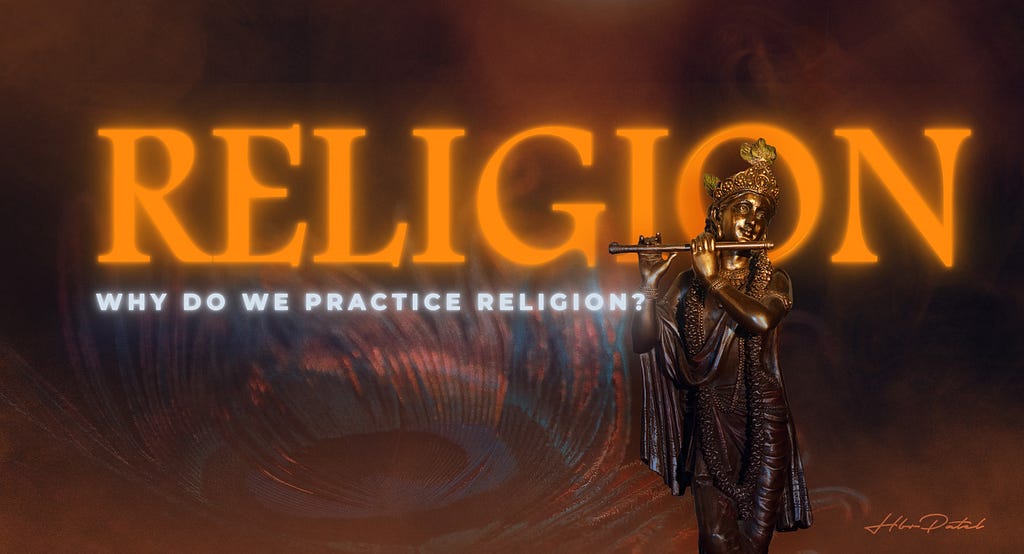H
HBR Patel
Guest
Understanding Philosophy, One Question at a Time…

Why Do We Practice Religion | HBR Graphic
Everyone has their own reason to practice religion.
Some practice religion to be near Bhagwan while some inherit religion.
Some practice religion to experience bliss while some are in search of inner peace & tranquillity.
Some practice religion to wash away their sins while some are securing their spot in heaven.
Some practice religion to be in the herd while some practice it to defy their near ones.
All in all, all those who believe in Bhagwan practice religion.
There are people who find it hard to believe in a superpower that has the power to create, nurture, and destroy.
Those who refuse to believe in that belief constitute about 1.2 billion individuals while those who believe and practice religion are about 5.6 billion according to the Pew Research Center’s 2012 global study of 230 countries and territories.
The atheist has their own reason not to believe in Bhagwan because they have something else to believe in. They attach their belief to Science and Facts.
Some psychologists doubt that Superpower and equated that Superpower with an illusion while for some thinkers, religion is the opium of the people.
Everyone describes the things that they can perceive with their senses.
And if you ask any believer like me, I will define and elaborate on the existence and need of that Superpower in accordance with the religion that I practice.
It is like the blind seeing an elephant. Some touched the leg of that Elephant and concluded that Elephant is like a thick Pole.
Some of them touched the elephant’s trunk and concluded that Elephant is like a thick snake.
The other one touched the elephant’s ear and concluded that Elephant is like a fan.
One touched the tusk and concluded that Elephant is a pointed spear. While another felt its tail to conclude that Elephant is like a rope.
They described what they were able to perceive with that limited sense but they couldn’t get the whole picture.
The same is true for all Believers.
To some believers, that Superpower becomes hard to confine in an idol while to other believers, any stone when invoked with spiritual ritual and divine touch is apt to represent that Superpower. Everyone has their own sets of beliefs and they use to define the Superpower.
That is why Belief is at the centre of the Religious believer and also of the non-believer.
For one: the presence of belief strengthens their faith in religion while for the other: the presence of belief in science and facts hinders them to believe in what their limited senses can’t perceive.
But today, let us keep the faith aside & proceed with curiosity to answer the question: Why do We Practice Religion?
One of those reasons as perceived by my limited sense is Morality.
Belief in Bhagwan guides the moral compass of many and helps them to take the higher/moral path in times of confusion.
According to a 2014 study by the Pew Research Centre, the majority of people around the world think you can’t be a good person without believing in God.
Rewards and Punishments are age-old concepts to get a favourable outcome.
Rewards are the comfort in the afterlife while Punishments are the discomfort in the afterlife. However, many believe that it’s not necessary to believe in God to be a good person.
Our Moral behaviour is influenced by how we are brought up and the environment around us. Religion helps us to reinforce moral behaviour.
Some might argue that is why there are so many wrongdoings.
To answer that let me tell you a story.
Two friends were strolling down a street.
One of the friends asked the other one: Why there exists so much evil, so much wrongdoing and problems in society, even though there is a religion in society?
The verbal answer would have made a point but that friend choose silence.
After a few steps, there came a public garden where children were playing in the mud. They were all dirty. Pointing to them, that silent friend asked the curious one: Why those children are dirty, even though there are soap and water?
“What a dumb question is that? One must use soap and water to get clean. It is not like that its mere existence is enough to get you clean. You have to use it.” answered the curious one with pride.
“Same way, religion was, is, and will be always there amongst us. It is eternal. All we have to do is to accept it and walk on the path. If you see someone wearing a crucifix, don’t take that as the certificate of morality. One has to act how he acted upon this earth. Being and Acting. Having it and Living it is altogether a different game.”
Some might argue that Morality can be developed without religion.
What if living a code within the moral code of conduct is defined as religious or pious life?
What if religion is there to inspire us to live our life in accordance with those moral codes?
Those are the questions that need some thinking and we would look into them in the future.
But for me, from what I can perceive with my limited senses, I believe in Bhagwan and that belief guides my moral compass.
For the excitement of rewards and for the fear of punishments that awaits in my afterlife, I always stick with that moral compass, and the majority of us do that.
Although, what is strange is that many deny the existence of Bhagwan but they fail to explain the supernatural phenomenon that guides and nurtures this universe, which even science fails to explain with its facts and equations.
All in all, believing in something greater than us direct us to religion.
Continue reading...
